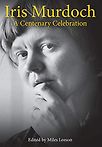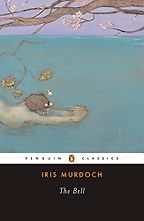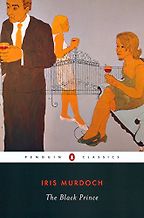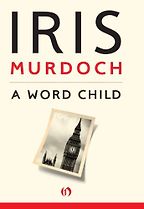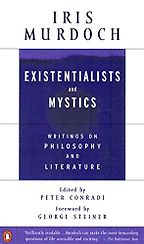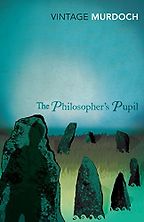Could you tell me a bit about who Iris Murdoch was—about her life as well as defining characteristics of her books?
Iris Murdoch was one of the greatest novelists of the late twentieth century, as well as a British philosopher. She always considered herself to be Anglo-Irish, although she’s very keen on her Irishness towards the end of her life. I think there’s probably a bit of myth-making in her own identity throughout her life, really—in who she was and indeed who she wanted to be.
She was born in Dublin in 1919, and then moved to London when she was just a year old. She returned to Ireland frequently for holidays, but she never spent much time there or lived there. She grew up in London and went to school there, and then later Badminton School in Bristol. From there, she won a scholarship to study at Somerville College, Oxford, where she received a first class degree in Mods and Greats, which is ancient history, Latin and Greek.
After that, due to the war, she went to work in London in the Treasury, and then subsequently worked for the United Nations Relief and Rehabilitation Agency in Belgium and then in Austria. She came back, having worked with refugees, and having met Sartre and various other people. She had a year’s studentship at Cambridge, where she met Wittgenstein before he moved to Ireland, and he had a great influence on her later thought. From then, she then got a position at St. Anne’s college in Oxford, where she taught until the early 1960s—she taught philosophy.
She taught philosophy for several more years before giving up teaching entirely towards the end of the 1960s, though she continued to write philosophy for the rest of her life. She started her novel writing with the publication of Under the Net in 1954. Then, between 1954 and 1995, there were 26 novels, each of them focused around a particular group or set of people, but all concerned with the ideas of freedom, goodness, and love. Her philosophy is very much concerned with the same elements as well.
Can you tell me a bit about the decline of her life towards the end? Her husband John Bayley wrote several books about her that became very famous.
One thing that most people know about her, even if you’ve never read her work, is that she suffered and ultimately died of Alzheimer’s disease in 1999. It was diagnosed a few years prior to that, and was announced in 1996 actually. At the end of her life, she went rapidly downhill. But there’s evidence to suggest that actually, she was suffering from the effects of Alzheimer’s well before that, even in the mid-1980s onwards.
“Iris Murdoch was one of the greatest novelists of the late twentieth century”
Her reputation suffered in some regards due to the three biographies of her that John Bayley wrote in the late nineties. One was published after her life, called Widower’s House (1999). The first two of his biographical works, Iris: A Memoir of Iris Murdoch (1998) and Elegy for Iris: A Memoir (1999), were the basis for the Oscar-winning film directed by Richard Eyre Iris (2001), which was very well-received, starring Judi Dench, Kate Winslet,Jim Broadbent (who won the Oscar) and Hugh Bonneville. There was also the major, official biography by Peter J. Conradi which came out in 2001; there was another biography called Iris Murdoch As I Knew Her by her friend A N Wilson in 2003. And the life writing, which the first ten years following her death really did color her image, and I suppose in some regards she really became the poster girl for Alzheimer’s.
Because of this, I think her fiction and philosophy suffers. But, after the death of an author, their reputation does suffer a bit. It’s only really now in the last five or ten years or so that her philosophy has come back into prominence, and really only the last few years that her fiction is being taken more seriously as well.
Before we discuss your book choices, I noticed that you didn’t choose The Sea, The Sea, which made me want to ask about your logic or rationale of deciding on these selections.
Unlike some novelists who don’t have an enormous list to choose from, Murdoch’s got a very wide canon of literature. I would say these choices are in some sense personal to me, but also represent a good selection and range from the work.
For me, The Sea, The Sea stands out for people because it won the Booker. If you go into a bookshop, quite often The Sea, The Sea will be one of the few (or perhaps the only) Murdoch novel that’s in stock. People know that that’s one to go for. But I don’t think it’s a particularly good entry novel into Murdoch’s work. Certainly when I’m teaching Murdoch’s fiction or when people ask me about it, I tell them that you probably ought to have read several of Murdoch’s works before you try and read The Sea, The Sea.
Is that length? Is that a degree of complicatedness?
I think so. I think you’ve got to be in tune with how Murdoch writes to enjoy The Sea, The Sea; you’ve got to enjoy her self-obsessed male narrator type. And there are plenty of those—The Black Prince and A Word Child have very self-obsessed, self-absorbed male narrators, much as The Sea, The Sea does. Charles in The Sea, The Sea is very much a man who says he’s given up or retired from the theatre to write his memoirs, but what happens in the book is that everybody from his life starts to come and join him, even if he doesn’t want them there—the past loves of his life who he hasn’t treated very well. He then rediscovers his first love, who is coincidentally living in the same village as where he’s staying.
It does work well; there are some wonderful passages about food and obsession. The thing for me is there are other novels that work just as well. She was nominated for the Booker six times and she could have won for any of them. I think she probably ought to have won for Black Prince. I think the Black Prince is her crowning artistic achievement over The Sea, The Sea.
Let’s turn to the first book on your list, which is The Bell (1958). I think this is her fourth novel, if I’m not mistaken—tell us a bit about it and why you chose it.
The Bell is recognized as her first major landmark. I think you can look at the first six or seven novels of her career, from Under the Net up to maybe An Unofficial Rose, where she’s playing with form and genre—just experimenting, really. Trying to find out what form of novel suits her temperament and her writing style. I think beyond Unofficial Rose, she’s very much found her niche and her style.
And what are the characteristics of that style, as it develops?
The characteristics of that style is that she writes primarily two types of novels. She writes closed novels, which focus on a small community or a household or a particular location. The Bell and The Black Prince would certainly be two closed novels, while A Word Child and Philosopher’s Pupil would be two open novels. An open novel would have a much wider range of characters; in the line of Dickens or perhaps Dostoyevsky, it features large numbers of characters dealing with major themes I outlined earlier such as what it means to be free, the fallings in and out of love that Murdoch’s novels are so well renowned for, difficulties with families or with the perception of each other as individuals, grief. Those would be some of her major themes for her fiction.
She claimed that The Bell was her lucky novel. There were three novels prior to that. The first two, Under the Net (1954) and The Flight from the Enchanter (1956), were very much dealing with issues that came out of her interest and then later difficulties with the post-Second World War existentialist movement and her own life living in London during the Second World War. So they’re very much influenced by continental writers like Sartre, Raymond Queneau, and Samuel Beckett. The Sandcastle (1957), her third novel, has been thought of as middlebrow female writing. It was seen as kind of a genre romance work, although that view has changed now.
“It’s got one of the most famous opening lines of any Murdoch novel”
The Bell was very well received. In the first year it sold over 30,000 copies, which was far more than any of her novels had ever sold before. It’s very well developed around a small community within Imber court and it focuses on the experiences of Dora Greenfield, a young woman of 21, who’s married a completely unsuitable man called Paul. Paul has gone off to this quasi-religious community which is attached to the religious community of the abbey, to undertake historical work relating to documentation. And he invites Dora, who is at that point in London, down to be with him. It’s got one of the most famous opening lines of any Murdoch novel, which takes a lot from Austen: “Dora Greenfield left her husband because she was afraid of him. She decided six months later to return to him for the same reason.”
And from that moment, we’re drawn into the novel. We want to know what’s going on with Dora. It has all the elements of a bildungsroman. Dora very much develops and works her way through the book, and in the end, ends up leaving Paul and having a life of her own. She’s going off to fulfill her vocation as a teacher. There are various characters along the way; certainly those that she meets when she gets to Imber, who influence her journey and her thoughts on life. And also her experience with nature, and with art as well, those are certainly important factors within the novel.
We might move on then to your second book choice, The Black Prince, which Murdoch writes more than a decade on. Tell us about why you chose this one.
It’s the most complex and complicated of Murdoch’s novels. It plays around with form; it’s a quasi-postmodern novel. It’s got a range of voices. It’s the story of an eccentric failed artist/ author called Bradley Pearson, who’s trying to write a great work of artistry. His great friend and rival is Arnold Baffin, a popular author who writes works that sell. And Bradley is intensely jealous of this. The relationship between Bradley and Arnold fuels the novel.
It’s Murdoch’s reflection on the question of what great art is, and what it means to be obsessed with other people. Bradley is obsessed with Arnold, and later on he’s obsessed with Arnold’s daughter, Julian, who perceives Bradley as this very strange man. She calls him a ‘funny uncle’ who she’s known all her life, and yet the two of them fall in love and have this great—though quite short-lived—relationship that’s intensely erotic and sexual, especially for Bradley, who hasn’t experienced this for a long time. There’s a wonderful scene in Covent Garden where he can’t stand even his own emotions and he’s sick in the flower market. There are moments of great humor in Murdoch’s novels and that’s one of them.
“The Black Prince is Murdoch’s reflection on the question of what great art is”
What else would I say about The Black Prince? Very like The Sea, The Sea, people from his past come back to haunt Bradley—friends, his ex-wife, his sister—and he fails to pay attention to them. This is one of the great themes of Murdoch’s novels: that we have to perceive people, and see them as they really are, and not as want them to be. It’s the same as in Word Child with Hilary Burde: Bradley just doesn’t perceive other people as they are. There are scenes of him discussing his love, or how he looks at his ex-wife, or Arnold’s wife, Rachel—with both of whom he has had relationships—where you see this. He’s quite a damaged character himself, but he’s also quite damaging to women. There’s what some people perceive as a rape scene with Arnold’s daughter Julian, while she’s dressed as a boy, so gender fluidity comes into it.
The interesting thing that makes the novel postmodern is that it has a foreword by an editor called P. Loxias, whom we later find out is the god Apollo. And then there are postscripts by other characters, including Julian, Rachel and Loxias. They frame the narrative, but we don’t have a clear idea who killed Arnold at the end. Arnold dies and he’s clearly been murdered, but is it Bradley? Is it Rachel? It could be Julian. And they all have their say at the end. It’s a novel that plays with form. I think Murdoch saw the beginnings of the postmodern movement. She’s read Nabokov and thought, “I can do this just as well.” That was her one major experiment with the postmodern form and it comes off very well indeed.
Your third choice, published two years later, is A Word Child. You briefly mentioned it a moment ago—why did you choose this one?
I chose it because it balances well with The Black Prince, and is very close in date with it. It comes from her most renowned period, from the late 1960s to the late 1970s, when she was producing almost a novel a year. All of them were very well received and very well reviewed. A Word Child is not unlike The Black Prince in the sense that it’s based around this one rather odd man called Hilary Burde, a repressed creature who we find out has had a difficult childhood, but has a brilliant mind. Through the support of a teacher, he manages to get to Oxford, and he could have gone on to be an academic superstar. But he has problems because he’s fallen in love with the wife of a friend, Gunnar Jopling, and the wife has fallen in love with Hilary, too. He shouldn’t have done this, quite clearly. There’s this awful moment when Hilary drives her away from Oxford and there’s a car crash and she dies. And she’s carrying Gunnar Jopling’s child as well.
That’s the background to where we begin. Hilary is 41; he’s a very minor civil servant in London, living in a shared flat and keeping himself to himself. He’s also responsible for his sister, Crystal. The relationships between siblings and twins come up in a lot of Murdoch’s novels. They’re very important in The Black Prince and in The Bell. And they are in this novel, too. Crystal sees things. She’s not classically intelligent, but she’s able to perceive reality as it really is, while Hilary isn’t. Later on, Gunnar comes back into his life and explains his love for his new wife and, in a tragicomic way, history repeats itself. Hilary falls in love with the second wife, and the second wife falls in love with him. There’s quite an uncomfortable scene between the second wife, Kitty, and their servant, Biscuit (not her real name). The back and forth between the two of them is quite racist and derogatory.
There are questions in the novel revolving around obsession. Hilary is in some sense this enchanter figure. If Murdoch believes there are some who perceive reality as it really is, Crystal is one. Christopher is another; he’s a saint-like figure. There are people that are patient and people that are violent and wish to take possession of people—that’s what A Word Child is all about.
Iris Murdoch seems in many ways to be a late-twentieth-century mainstream British novelist, but so many of her preoccupations, with love and relationships and the connection between morality and the aesthetic and philosophy and theology, a quite deep and abiding and philosophically complex.
Hugely, yes. She ought to be seen as the heir to the nineteenth-century realist novels of George Eliot, Dickens, Dostoyevsky, even going back to Austen. Her great favorite, whom she described as the patron saint of the novel, was Shakespeare. She wants to tie herself in to that huge canon of Western thought and literature. It was a response to the high modernism of the generation before her.
This is a good point talk about her philosophical writings and her literary criticism, collected in Existentialists and Mystics: Writings on Philosophy and Literature. It’s important to mention she’s a tutor at Oxford throughout a good early portion of her career.
She taught in Oxford from the late 1940s to 1961. So about 12 or 13 years. She’s a tutor in philosophy and she’s teaching the greats of moral philosophical thought. She teaches Plato and Aristotle, right through to Kant and Nietzsche and beyond—she did come up to the modern era, but she was very happy teaching Hume and Hegel. She had a very wide range of interests in what she taught, but she always went back to Platonism. Platonism was her great love and it underpins a lot of the novels, certainly the ones we’ve been talking about today. This idea of the transcendence towards the good and how we manage to achieve that it in our frail and limited human form, how we move slowly towards potentials of goodness and how some people aren’t able to because of self-obsession, ego—those kinds of issues.
Do you have any favorite essays in Existentialists and Mystics that you want to draw the reader’s attention to?
It’s a wonderful collection published in 1997 by Murdoch’s biographer, Peter Conradi. He told me it was his crowning achievement, more so that the biography, which I thought was surprising. If readers are coming fresh to her non-fiction, I would say you’ve got to read ‘Against Dryness’ from the 1950s. It’s the best discussion of literary fiction and where we are. Even 70 years on, it’s very much still relevant, addressing contemporary themes such as, ‘Where is the novel now? How do we combat our own insularity and moral life? What does the novel do?’ And she argues that it needs to break out of the forms that it finds itself in and move back to discussing life—the outer lives of characters, but their inner thoughts as well. As I mentioned earlier, in this, Murdoch goes back to major nineteenth-century novelists.
“Murdoch ought to be seen as the heir to the nineteenth-century realist novels of George Eliot, Dickens, Dostoyevsky, even going back to Austen”
I’d also draw your attention to the three essays that were collected in the 1970s and published as kant, but were republished in Existentialists and Mystics. Those would be ‘The Idea of Perfection,’ ‘On God and Good,’ and ‘The Sovereignty of Good Over Other Concepts.’ She discusses a variety of ideas, but this idea of perfection, how we reduce the ego, how we move from a form of traditional Christianity that she feels is failing us in the West (in ‘On God and Good’), and moving away from the pervasive, all-seeing God the Father towards a more enlightened view of goodness in the Platonic tradition. In ‘The Sovereignty of Good Over Other Concepts’ she continues this discussion, and remarks upon how difficult it is to perceive goodness in others and how we move towards it and how we can do it through nature or we can do it through art. It’s this idea of transcending ourselves and moving away from our own selfish concerns. Those would be the four essays I’d recommend. There’s so much richness in there, but those four might be her most important essays.
That’s really interesting. Last we have The Philosopher’s Pupil, which was published in 1983. Tell us a bit about this one and why you chose it.
Murdoch’s novels can be divided into three periods. You’ve got the early developmental and experimental stage. Then you’ve got the major period that concludes with The Black Prince. Then you have the later novels. These are often called the ‘baggy monsters’ (a quote taken from Henry James about his large, quasi-allegorical novels.) Later in her life, from Nuns and Soldiers onwards, really, the novels get longer and longer as she tries to expand the range of characters. Sometimes we get 20 or 30 characters in a novel. The novels are quite Dickensian and influenced by Dostoyevsky. She keeps the same ideas and concerns and concepts that I mentioned earlier, but she’s trying to pack in much more of life. There are elements of the historical novel on occasion.
The Philosopher’s Pupil is my favorite of the late novels. There’s an enormous web of characters and an interconnected society. This is one of the few novels that creates a completely realized setting outside of London. It’s set in one town that Murdoch develops. It’s a spa town, but it has only a passing resemblance to British spa towns like Cheltenham or Tunbridge Wells. The major conflict is that the philosopher is coming back to town. John Robert Rozanov is perceived by the town as a great sage. His arrival sparks off a lot of the action that occurs within the novel.
Five Books interviews are expensive to produce. If you're enjoying this interview, please support us by donating a small amount.
Like Charles Arrowby, Rozanov has retired from philosophy and teaching. In the novel it says “all the books are inside him now”; he believes he understands everything. And yet he’s a tragically flawed character himself because he falls in love with and wants to seduce his own granddaughter. Ultimately, he palms her off on to somebody else. That’s quite an uncomfortable scene. And then there’s the pupil of the title, George McCaffrey, one of three brothers in the novel who are all antagonistic towards each other. The novel opens with George trying to kill his wife by crashing a car into a canal. The big Murdochian themes are all there. There’s a lot of water imagery; there’s a lot of being outside, looking in through windows. This idea of perception through rain is important in the novel. There’s an enormous cast of characters. There are animals; there’s a small dog that runs into the sea and you wonder whether he’s going to be rescued or not. Murdoch’s good on animals and water imagery. We haven’t talked that through today, but there’s plenty there.
It’s a book about aging, as well. All the characters are aging and trying to find their place in life. There’s a priest that loses his identity called Bernard Jacoby, there’s a Quaker, who’s the saint figure, the image of the piece, called William Eastcote, who’s important to the moral weight of the novel. You have different characters who embody different ideas and concerns, or philosophical ideas. Rozanov, the McCaffreys who are chasing after him, Eastcote who’s a Quaker and talks about demythologizing of religion, Bernard Jacoby, the priest who loses his religion and wants to move towards some kind of quasi-Buddhist idea, which was in Murdoch’s mind very much at that time. It’s a difficult novel to talk about because there’s so much going on. It’s very much a big novel of ideas. But it’s beautifully wrought as well. There’s lots of humour, mistaken identity. Those sorts of things.
This introduction to her novels has revealed them to be fascinating and full of compelling characters and grips and turns and interesting observations about life and love and philosophy. To close—and this might be unfair—to someone who hasn’t read Iris Murdoch, especially at this crucial point with her as the poster child for Alzheimer’s is being replaced by a more considered look back at her work, why read Iris Murdoch? And what do you think her legacy will look like in the future?
Why read her? Because, like all great novelists, she speaks to us today because she’s interested in universals. She’s interested in what makes us human. She’s interested in our flaws, our ego, our propensity at times of emotional crisis to do stupid things, to fall in love with the wrong person, or completely disregard the person who would be right for us. She talks about familial relations. She asks what it means to consider ourselves outside of ourselves. To think about whether there is such a thing as goodness. Where does goodness exist? Does God matter anymore? What about Judeo-Christian imagery? What does it mean to be good? Should we be good for nothing? Or is there some kind of redemption in life? How do we deal with guilt? A lot of the novels deal with guilt and what happens when we cause people a lot of pain. If they’ve died, how do we then forgive ourselves?
All those questions are not just relevant for when she was writing but impact on our lives today because, like the nineteenth-century novelists she wished to emulate, these questions come back again and again and again. As Murdoch is part of this literary lineage she’ll never not be relevant. And I think that her books, although they were out of fashion for a number of years, have recently been coming back into consideration. She’s now being considered in light of her particular take on feminism, she’s being thought of as an important female writer not just as somebody who deals with male narrators. In the past she’s been criticized for that, but since her centenary year in 2019 there has been a reassessment of what her legacy is and how her own life and her own biography is so tied up with her novels. Certainly now that we have biographies, her letters and publications of her poetry and journals to come in the next few years, I think interest in Iris Murdoch will just continue to grow.
Thank you very much. Is there anything else you’d like to add?
The only other thing I’d mention is that if I was going to recommend somewhere to start with Iris Murdoch, I’d recommend The Bell. It’s short, it’s contained, it’s got a great story. It’s highly enjoyable, it’s amusing and comic, but there are also plenty of what you might call stereotypical Murdochian images of ideas. If you enjoy The Bell, I think you’d go on and enjoy many more of her novels.
Five Books aims to keep its book recommendations and interviews up to date. If you are the interviewee and would like to update your choice of books (or even just what you say about them) please email us at [email protected]

